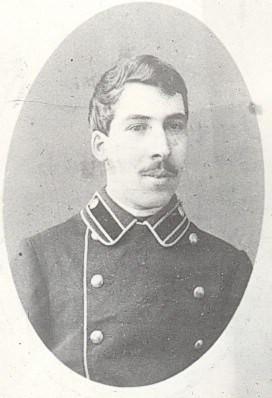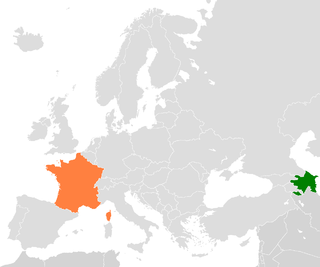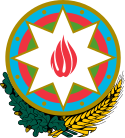
The Politics of Azerbaijan take place in an authoritarian system where elections are not free and fair, political opponents are repressed, civil rights are limited, human rights abuses are widespread, corruption is rampant, and power is concentrated in the hands of President Ilham Aliyev and his extended family.

The chairman of the government of the Russian Federation, also informally known as the prime minister, is the head of government of Russia. Although the post dates back to 1905, its current form was established on 12 December 1993 following the introduction of a new constitution.

The prime minister of Lithuania is the head of the government of Lithuania. The prime minister is Lithuania's head of government and is appointed by the president with the assent of the Lithuanian parliament, the Seimas. The modern office of prime minister was established in 1990, when Lithuania declared its independence, although the official title was "Chairperson of the Council of Ministers" until 25 November 1992.

The Nagorno-Karabakh conflict was an ethnic and territorial conflict between Armenia and Azerbaijan over the region of Nagorno-Karabakh, inhabited mostly by ethnic Armenians until 2023, and seven surrounding districts, inhabited mostly by Azerbaijanis until their expulsion during the 1990s. The Nagorno-Karabakh region was entirely claimed by and partially controlled by the breakaway Republic of Artsakh, but was recognized internationally as part of Azerbaijan. Azerbaijan gradually re-established control over Nagorno-Karabakh region and the seven surrounding districts.

Mirza Davud Baghir oghlu Huseynov, also spelled Husseynov or Huseinov, was an Azerbaijani revolutionary and statesman.

The Cabinet of Ministers of the Republic of Azerbaijan is the highest executive body of Azerbaijan, the executive and governing body over the ministries and other central executive bodies under the president of the Republic of Azerbaijan.

In 1991, Azerbaijan recovered its independence from the Soviet Union, which was recognized by Greece on December 31, 1991. Diplomatic relations were established in 1992. The Greek embassy in Baku was opened in the spring of 1993. The embassy of Azerbaijan in Athens was opened in August 2004.

After the dissolution of the Soviet Union, Azerbaijan and Ukraine gained their independence from the Soviet Union and started a close friendship with establishing diplomatic relations in 1992. The relations of strategic cooperation, political, economical and cultural relations between two countries are at a very high level. Azerbaijan currently plays an important role in both organization and the foreign policy of Ukraine due to its strategic role in the region.

Mammad Hasan Jafargulu oglu Hajinski was an Azerbaijani architect and statesman. He also served as a Minister for Foreign Affairs of Azerbaijan Democratic Republic (ADR) and the last Prime Minister of ADR.

The Government of the Union of Soviet Socialist Republics (USSR) was the executive and administrative organ of the highest body of state authority, the All-Union Supreme Soviet. It was formed on 30 December 1922 and abolished on 26 December 1991. The government was headed by a chairman, most commonly referred to as the premier of the Soviet Union, and several deputy chairmen throughout its existence. The Communist Party of the Soviet Union (CPSU), as "The leading and guiding force of Soviet society and the nucleus of its political system" per Article 6 of the state constitution, controlled the government by holding a two-thirds majority in the All-Union Supreme Soviet. The government underwent several name changes throughout its history, and was known as the Council of People's Commissars from 1922 to 1946, the Council of Ministers from 1946 to 1991, the Cabinet of Ministers from January to August 1991 and the Committee on the Operational Management of the National Economy from August to December 1991.

The Ministry of Defence of the Republic of Azerbaijan or MN is an Azerbaijani government agency that is associated with the Azerbaijani military. The ministry is responsible for keeping Azerbaijan defended against external threats, preserving its territorial integrity, waging war on behalf of Azerbaijan, and the surveillance of the Azerbaijani sector of the Caspian Sea sea and airspace. The Minister of Defense is appointed and removed from the post by the Commander-in-chief of the Azerbaijani Armed Forces, the President of Azerbaijan.

The Ministry of Economy of Azerbaijan Republic is the central executive body responsible for implementing state policy and regulation of the economy in Azerbaijan.

The State Statistics Committee of Azerbaijan Republic is a governmental agency within the Cabinet of Azerbaijan in charge of collection, processing and disseminating statistical data on the economy, demographics and other sectors of activity in Azerbaijan Republic. The agency is headed by Arif Valiyev.

Diplomatic relations between Azerbaijan and Hungary were established a year after the former state's declaration of independence from the Soviet Union.

Healthcare in Azerbaijan is provided by public and private healthcare institutions and regulated through the Ministry of Healthcare.

The diplomatic relations between Azerbaijan and Portugal were established in 1992 after Portugal recognized the independence of Azerbaijan.

Relations between Turkic Council and Azerbaijan started from the year of 2009 until present. Taking into account of the establishment date of the organization, Azerbaijan continues relations as a member of the founding country.

Azerbaijan—France relations are the bilateral relations between the Republic of Azerbaijan and the French Republic in the political, socio-economic, cultural, and other spheres.




































